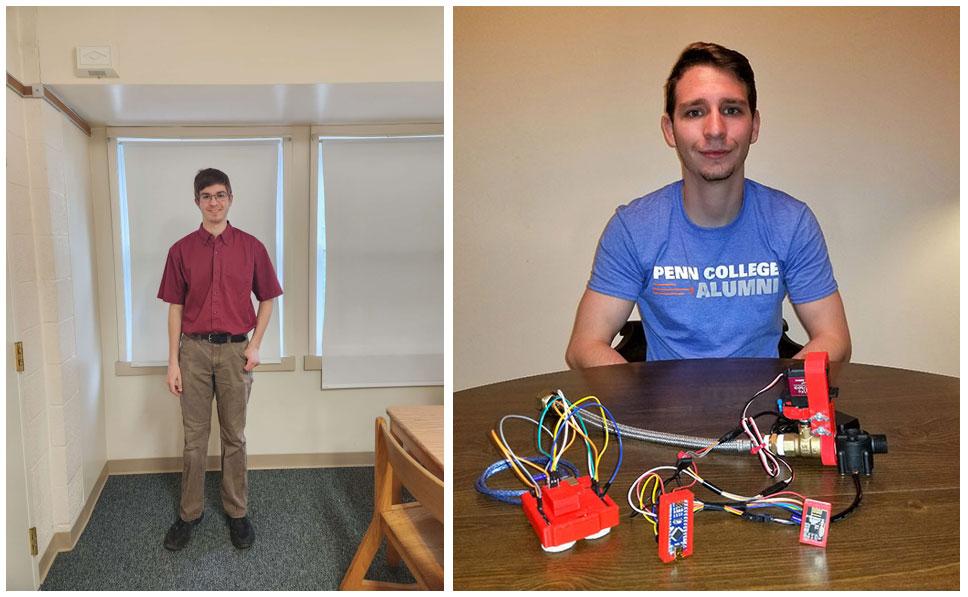Senior projects produce remote control systems
Wednesday, May 10, 2023
Photos provided
As an assistant professor and department head, Ken J. Kinley looks forward to the slew of senior projects presented by electronics and automation students each spring at Pennsylvania College of Technology.
The semester-long endeavor serves as a capstone for four years of intensive hands-on instruction integrated with theory. It’s the final steppingstone in the transition from student to a tomorrow maker in industry.
“The senior project is an accumulation of students’ experiences both in and out of the classroom. Each project is unique to the individual and showcases the hard work that simply can’t be summarized on a resume,” Kinley explained.
This year, he identified two projects that stood out among the seniors’ outstanding work: a home control system developed by Austin N. Deibert, of Slatington, and an automated valve control system devised by Nicholas Semon, of Norristown.

Austin N. Deibert (left) and Nicholas Semon
Both students are set to graduate on May 13 with bachelor’s degrees: Deibert in automation engineering technology: robotics & automation, and Semon in electronics & computer engineering technology.
“Their projects involve software that was implemented to control hardware,” Kinley said. “They designed and made some of the hardware on their own and programmed their phones to control the hardware from anywhere in the world.”
Deibert’s project turns a fan on and off via a smartphone and uses the same technology to monitor and water plants remotely.
“With a push of a button, you see the moisture level of the soil. If the soil gets too dry, the system will water the plant automatically,” Deibert said.
The “system” includes a water jug funnel, a quarter-inch pneumatic hose and a solenoid valve energized by a programmable logic controller relay output. Deibert also designed and built the moisture sensor by soldering wires to two steel nails serving as probes.
The 125-150 hours spent on the project involved 3D-printing various holders and fittings in the Dr. Welch Workshop: A Makerspace at Penn College and working with Brad E. Lenig, enterprise infrastructure engineer, to integrate the system with the college’s wireless network.
“I am most proud of the fact that I got my project done early, doing everything I proposed and more,” Deibert said. “The applications for home automation are endless as long as you know how to do it.”
Semon’s endeavor also involves a valve and took 100-plus hours to complete. Specifically, it facilitates controlling the volume of water that passes through a half-inch brass ball valve. An interface created by Semon permits the operator to input – remotely – a specific volume of water. That information is communicated wirelessly to an actuator that opens and closes the valve. In real time, the interface displays the flow rate and accumulated volume passing through the valve.
“I’m very proud of the mechanical work done for my project,” Semon said. “I had very little experience working with plumbing and CAD before this project. The housing for the actuator is 3D-printed, and half-inch plumbing is used to connect the valve to a water tap.”
An internship last summer at Westinghouse Electric Co. in Ruffs Dale inspired Semon’s work.
“I was shown large-scale valves that are used in nuclear power plants that are not automated or digitized in any way,” he said. “I set out to make a prototype of an automated valve so that the concept could possibly be scaled to larger valves used in nuclear plants.”
Following graduation, Semon will return to Westinghouse Electric to work as a field service engineer.
“I am thankful for the opportunities provided to me by Penn College to be able to pursue a passion that I have and to be competitive in the job market so that I can continue doing what I love,” Semon said.
Deibert also has accepted a full-time position. He’s been selected for the automation apprenticeship program at Niagara Bottling and will be traveling to the company’s plants throughout the United States.
“I am grateful that Penn College has given me the skills to not only be useful but also to be in high demand in all parts of industry,” Deibert said.
Kinley isn’t surprised that Deibert and Semon secured employment prior to commencement, based on the skills and professionalism both exhibited with their senior projects.
“I was really impressed by their presentations in front of our advisory board, which included approximately 15 industry representatives,” Kinley said. “You could tell that Austin and Nicholas knew their projects well by the way they answered questions from the audience.”
For information about associate and bachelor’s degrees related to electronics and automation, as well as other majors offered by Penn College’s School of Engineering Technologies, call 570-327-4520 or visit www.pct.edu/et.
Penn College is a national leader in applied technology education. Email the Admissions Office or call toll-free 800-367-9222.
